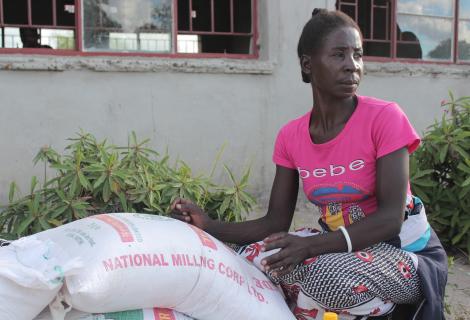
ACTIONAID ZAMBIA VIEWS 2020 AS A CHALLENGING YEAR IN ACCOUNT OF THE NATION’S SOCIO-ECONOMIC STATUS AND POLITICAL GOVERNANCE
As the year 2020 comes to an end, ActionAid Zambia has witnessed with concern a downward spiral in relation to the socio-economic, political governance, and human rights violations in the country.
2020 can be described as a difficult year for Zambia on the economic front, where most of the economic fundamentals deteriorated drastically. The nation’s economic growth was projected at 3 percent; however, it plummeted to negative 4.2 percent as early as quarter two (2) of 2020. The nation experienced its first recession in more than two decades, mainly exacerbated by the advent of COVID-19 and the ever-increasing public debt stock, now standing at $18.5billion. With all recommended debt sustainability indicators and/or benchmarks breached, Zambia became the first African country to default on its debt interest repayments after failing to meet the US$ 42.5 million debt repayment on its US$ 3 Billion Eurobonds on 14th of November 2020. Additionally, the Zambian Kwacha was reported to be among the worst-performing currency in Africa, depreciating by more than 50% from end-December 2019 to End-December 2020. And the inflation rate was not only unstable but was above the Bank of Zambia target of 8%. It increased from 11.7 percent in December 2019 to 19.2 percent as of December 2020.
The economic vulnerabilities and deterioration entail that many vulnerable Zambians were pushed below the poverty line. With a high inflation rate and a free failing currency, for an import-dependent country like Zambia, this led to the cost of living to dramatically go up for the ordinary Zambian. According to JCTR latest BNB, the cost of a food basket now stands at K7, 126.62 which is far above the average household income for most Zambians. This does not only threaten the survival of many Zambians but also makes a reality of dignified life an impossibility.
Although we saw the enactment of the National Budgeting and Planning Act, a move to amend the Financial Intelligence Act in the quest to improve the effectiveness and efficiency of allocation and utilization as well as to curb corruption, corruption continued to be the talk of the day in 2020 midst the economic hurdles. Throughout the year, we continued to lose public resources in the hands of our civic leaders, whom we have given the mandate to manage the resources on our behalf. Corruption in the management of public finances reached another down tram level in Zambia with notable sad incidences, for instance, the mismanagement of COVID-19 donations. Corruption has also continued to widen the gap between the poor and the rich in Zambia, strapping poor Zambians on both the social and economic front.
The year also saw the worst violation of human rights which included the denial to exercise rights of freedom of assembly and expression through the continuous denial of police permit and arrests of opposition political leaders and their perceived sympathizers, which led to a group of young people demonstrating in the bush and online in raising awareness on this injustice. The police brutality was witnessed in 2020; where Carol Kambwili was publicly harassed by the police, and not forgetting the killing of innocent, defenseless, and unarmed citizens like Mugala, a young boy whose only concern was completing his homework, and the latest killing of Mr. Nsama, a state prosecutor.
Furthermore, independent media was not spared. The arbitrary closure of Prime Television for eight months now over a frivolous case and reported cases of District Commissioners and political party cadres threatening and harassing media houses that would try to cover opposition party leaders are some of the few examples of how the media voices were stifled.
However, one major win of 2020 was the collapse of the Constitution Amendment No. 10 of 2019. The Constitution Amendment process was flawed from inception as it did not meet the democratic principles of the constitution amendment process. Furthermore, the subsequent content of the bill undermined the principles of constitutionalism and good governance. The bill was short of the aspirations of all patriotic and well-meaning Zambians; therefore, its collapse was a win for all well-meaning Zambians.
ActionAid Zambia would like to urge the government of Zambia to work towards restoring the rule of law especially as we head toward the 2021 general elections. This will be key in limiting and checking the arbitrary, oppressive, and despotic tendencies of power, and to ensure the equal treatment and protection of all citizens irrespective of race, tribe, class, status, religion, place of origin, or political persuasion.
As its primary responsibility, the government must endeavor to promote and protect human rights which include the right to life, freedom of the press, association, assembly, and expression to provide a level playing field for all citizens and all political players as we go toward the 2021 general elections.
Apart from COVID-19, unsustainable public debt and high corruption levels being major contributors to our current economic malaise, as we go into 2021, ActionAid would like to urge the government to avoid the temptation of borrowing more while seeking sustainable solutions to our current debt problems. The Government should also enhance the fight against corruption by ensuring the prosecution of perpetrators of financial crimes regardless of their social status and political affiliation.
Nalucha Nganga Ziba
Country Director, ActionAid Zambia